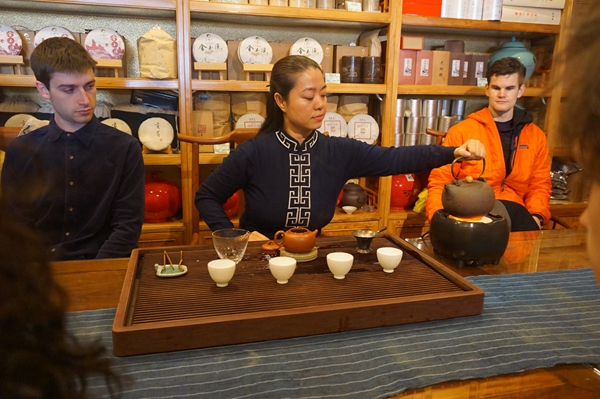On Friday afternoon of October 26th, Yenching Scholars visited a teahouse (绿山九茶城) in Chaoyang district of Beijing to participate in a tea-making workshop. As part of YCA's Culture Salon series, scholars had the chance to learn about and enjoy China's tea-making culture. Arriving mid-afternoon, the sunlight already began filtering through the wooden-paneled tea shop, giving off a warm afternoon glow. Inside the teahouse, the tea-makers welcomed the scholars.

Monica, an expert tea-maker, began the workshop with a step-by-step explanation of the tea-making process. First, she began by rinsing the cups and utensils with hot water, an important part of preparing the tea set. She adeptly used tongs to empty the hot tea-cups before placing them gently on the table. She brought out a plate of Oolong tea leaves, which she explained are mostly grown in the southern province of Fujian, China. Passing the tea around, she encouraged the audience to take in the subtle but earthy smell of the leaves.

Handling the leaf holder, she poured the tea leaves into the clay pot. As the kettle was boiling, she explained that she must wait for the water to boil and then to cool down to around 80 degrees Celsius before she could start preparing the oolong tea. She explained that because of chemical properties, different types of teas should be matched with different water temperatures. After the kettle of boiling water had cooled down to an adequate temperature, she gracefully lifted the kettle above the tea pot, allowing the water to pour from a high point so that the water stream could catch air particles, making the water ‘lighter’. Briefly steeping the tea, she then disposed of the first brew, explaining that the first brew is only used to help ‘awaken’ the tea leaves. With the second brew of tea, she allowed the audience to sniff the warmed and dampened leaves, which had entirely changed in fragrance. Now a pungent smell wafted and tantalized the senses. She then poured four cups of tea to onlookers, welcoming the guests to enjoy the aromatic tea.


Following this demonstration, Monica went on to explain the history and processes behind China's tea-making culture, which has been an important aspect of Chinese culture for over 4000 years. Learning about different types of teas, from green tea, to white, black, oolong, and jasmine, the scholars also had the chance to smell and make their own pots of tea. Indulging in the sweet fragrances of jasmine tea or the more earthy tones of pu’er teas, the scholars began feeling the effects of being ‘tea-drunk’, a feeling that starts when one has tried too many varieties of teas. To help stave off this feeling, the tea-makers supplied the scholars with small snacks, which also helped to keep hunger at bay. As a special treat, Monica and her colleagues brought out some of their most prized and expensive teas: longjing tea from Hangzhou's famous West Lake.



Throughout the tea-making workshop, scholars sipped the fragrant and delicate tea while enjoying the company of their fellow classmates. Especially after a week of intensive classes, Yenching Scholars finally had a chance to relax and enjoy with their classmates one of China's richest cultural products.

photos by Jennifer Jia-hong Liu, Michael Chen